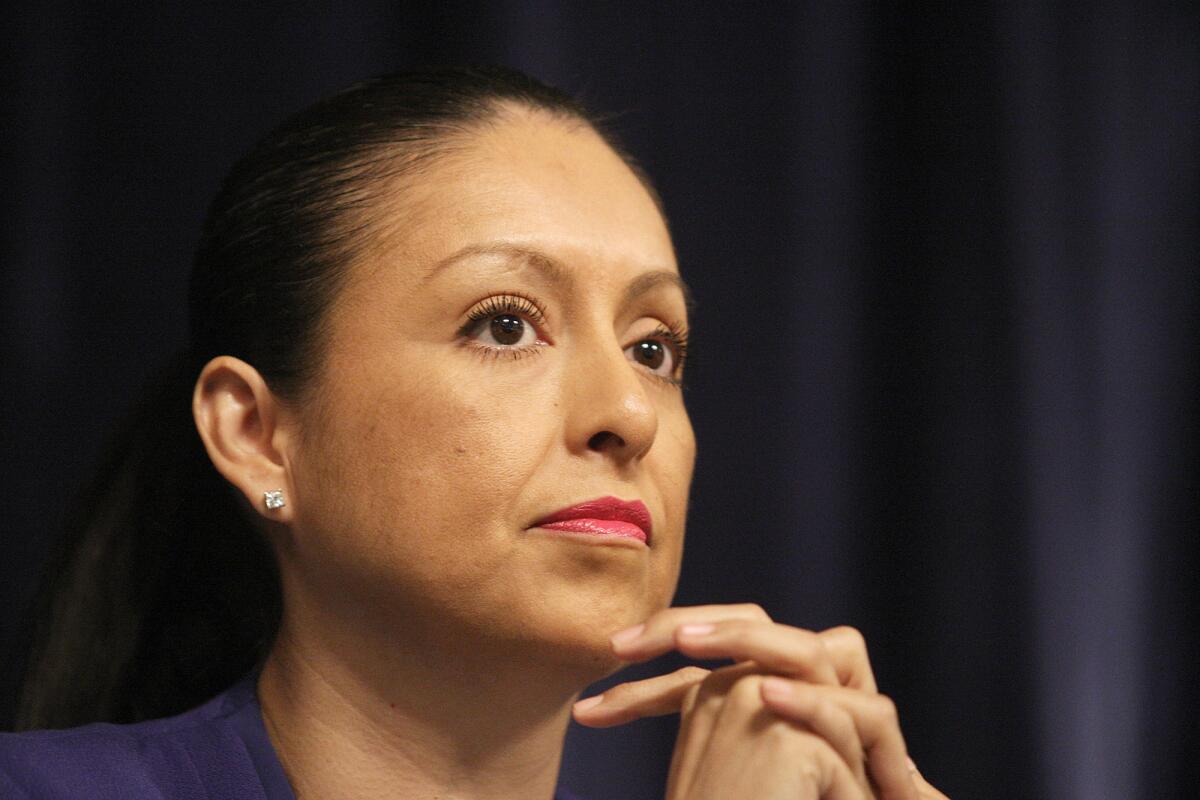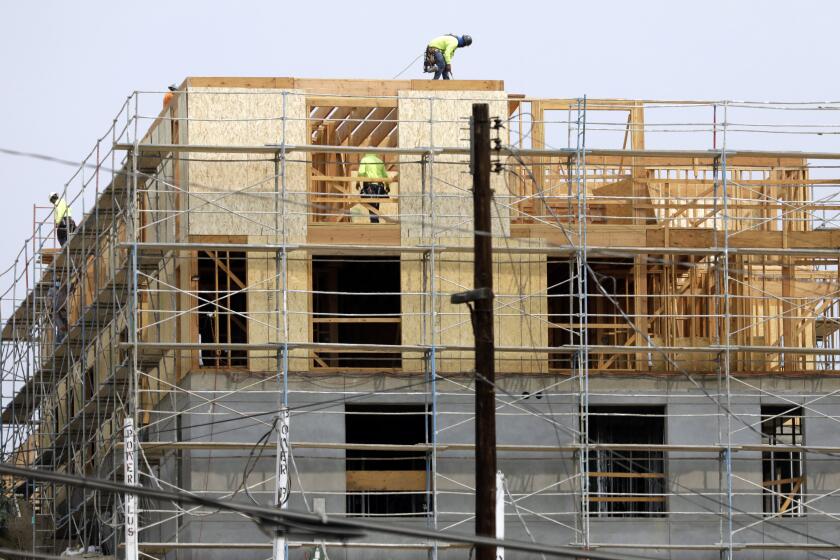L.A. hitches conditions to funding rent assistance for homeless people

The Los Angeles City Council decided Wednesday to allocate tens of millions of dollars in federal grant money for “rapid rehousing” — a program that includes rent assistance for homeless people — but will hold off on handing over much of the money until the Los Angeles Homeless Services Authority shows progress in housing people with the funds.
Council President Nury Martinez, who rejected a staff proposal to immediately authorize $97 million in spending for rapid rehousing and related programs, argued that the city needed to hold the agency accountable because it “frankly has underperformed in the past.”
At a committee meeting last week, Martinez said there had been problems using money allocated for such programs in the past and “I just want to make sure you’re able to deliver.”
“The status quo is simply not working,” Martinez said Wednesday. “Just look outside the window and you will see more unhoused folks than ever before.”
The debate over the spending underscored frustrations at City Hall with LAHSA. When Martinez took on the powerful position of council president this year, she questioned its effectiveness in tackling the homelessness crisis.
Under her plan, approved Wednesday, the city will approve up to $97 million for rapid rehousing and related programs, but is authorizing only $30 million to be spent at this point.
Getting approval to spend more will hinge on regular reports to the city on its progress, although city officials did not specify any particular targets to meet before they would hand out more funding. The money comes from a federal grant meant to assist homeless people at dire risk from COVID-19.
Martinez also insisted that any agreement for using the federal grants require LAHSA to provide additional information about their outreach and mandate that their contractors report back on their performance.
During Wednesday’s meeting, Councilman Mike Bonin pushed for the city to authorize the agency to use the entire $97 million on the rental programs, which he argued would ensure people got help more quickly.
Bonin said that holding back on the rest of the money could slow the program rollout. Homeless service providers raised concerns that nonprofits that contract with LAHSA to do the work may be reluctant to hire new staff needed to carry out the program if future funding is unpredictable.
Ahead of Wednesday’s vote, homeless advocates warned that paring back that spending to $30 million — as the council was considering doing — could leave 2,000 people in the lurch for permanent housing after the phaseout of Project Roomkey, which leases hotel and motel rooms for homeless people who are especially vulnerable to the coronavirus.
“Renting apartments is cheaper and faster than any other solution to homelessness that we have,” said Tommy Newman, a senior director at United Way of Greater Los Angeles. Doing so has been challenging in the past because there were scant vacancies, but now “landlords are reaching out and saying, ‘I have units.’ It’s foolish to not take advantage of that.”
The average cost of projects funded by a $1.2-billion bond program have risen from $350,000 to $531,000.
Councilman David Ryu was the sole council member to join Bonin in backing his amendment, which was overwhelmingly rejected by the rest of the council.
“We’re not going to just throw money at this. ... I see no value in putting all the money up front,” said Councilman Gil Cedillo.
Although the council officially approved up to $97 million for the programs, Eric Ares, manager of Homeless Systems Change for the United Way, said that did not ease his concerns that fewer people would end up getting help. Not authorizing all that money to be spent, Ares argued, would make it harder for service providers to implement the program.
At Wednesday’s meeting, council members repeatedly praised Heidi Marston, who became LAHSA’s executive director earlier this year, but alluded to concerns with the agency. Councilwoman Monica Rodriguez said that Marston’s brief tenure has been “a refreshing change from where we were,” but “we’ve got a very dark history to get past.”
Marston said she heard from council members “loud and clear” that they wanted to see what they were getting for their money.
“This is all about balancing the need for transparency and accountability” with the demands of the moment, Marston said after the vote. She said she was eager to work with the council, but cautioned that “anything that is putting further restrictions on our ability to build momentum is going to impede our ability to house people quickly.”
City officials had initially proposed spending $97 million in federal funds to cover four years of rental assistance and other services to house 3,000 people under rapid rehousing and related programs.
Rapid rehousing programs traditionally reduce the rental assistance over time as the tenant becomes more stable and able to handle the costs on their own.
Marston said that in addition to that traditional model, which is meant for people with lesser needs, the programs would also serve as a “bridge” for people who need more support as they await permanent housing being built for homeless people. Those residents would also get intensive case management.
“The idea is getting people into the units now,” without having to build something new, said Meg Barclay, homeless coordinator for the City Administrative Officer. Barclay added that nightly costs were similar to operating shelters.
The money for rapid rehousing is being allocated as part of a broader plan to address homelessness during the COVID-19 pandemic, which also includes funding for tiny homes known as “pallet shelters” and leasing units. Council members also approved money for those programs.
More to Read
Sign up for Essential California
The most important California stories and recommendations in your inbox every morning.
You may occasionally receive promotional content from the Los Angeles Times.












